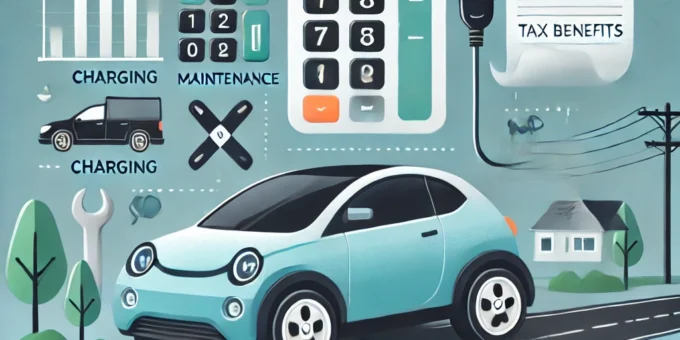
How to Calculate the True Cost of Owning an Electric Vehicle
Electric vehicles (EVs) have grown in popularity thanks to their eco-friendly features, lower running costs, and advancing technology. But while they offer significant benefits, understanding the true cost of owning an EV is key to determining if it’s the right choice for you. Beyond the sticker price, you’ll need to factor in expenses like charging, maintenance, insurance, and potential savings from tax incentives or rebates.
This guide will break down every cost component of owning an electric vehicle, helping you make an informed financial decision.
Understanding the Initial Purchase Price
The initial purchase price of an electric vehicle is often higher than that of a comparable gas-powered car. Here’s why:
- Battery Costs: EV batteries are expensive to produce, contributing significantly to the price.
- Advanced Technology: Features like regenerative braking and high-tech software add to the cost.
However, these prices are steadily dropping as EV technology advances and production scales up. Popular models like the Tesla Model 3 and Nissan Leaf now have starting prices comparable to mid-range gas vehicles.
Federal and State Incentives
One of the biggest financial advantages of owning an EV is the availability of incentives. These can significantly reduce your upfront costs:
- Federal Tax Credit: In the U.S., you can receive up to $7,500 in federal tax credits, depending on the make and model of your EV.
- State and Local Rebates: Many states offer additional incentives, including rebates, reduced registration fees, or access to HOV lanes.
- Utility Company Discounts: Some utility companies provide rebates for purchasing EVs or installing home charging equipment.
Tip: Check the U.S. Department of Energy’s website or your country’s EV programs to see what incentives you qualify for.
Charging Costs at Home
Home charging is one of the most cost-effective ways to power your EV. To calculate your home charging costs:
- Know Your Electricity Rate: Find the cost per kilowatt-hour (kWh) on your utility bill.
- Battery Size: Multiply the size of your EV’s battery (in kWh) by the electricity rate.
- Charging Efficiency: Account for slight energy losses during charging (typically 10%).
Example Calculation:
- Battery Size: 60 kWh
- Electricity Rate: $0.15/kWh
- Full Charge Cost: 60 kWh × $0.15 × 1.1 (efficiency factor) = $9.90
For a car with a 250-mile range, this equals about $0.04 per mile—far cheaper than gasoline.
Public Charging Costs
While home charging is cheaper, public charging is essential for road trips or when you’re away from home. Costs vary depending on the type of charger:
- Level 2 Chargers: Typically cost $0.20–$0.30 per kWh.
- DC Fast Chargers: Range from $0.30–$0.50 per kWh but can charge your car much faster.
- Membership Discounts: Charging networks like Electrify America or EVgo offer subscription plans with lower rates.
Battery Longevity and Replacement Costs
The lifespan of an EV battery is typically 8–15 years, depending on usage and climate. Most manufacturers offer warranties covering the battery for up to 8 years or 100,000 miles.
- Replacement Costs: Replacing a battery can cost between $5,000 and $15,000, but improved battery technology is expected to reduce these costs over time.
- Extending Battery Life: Avoid frequent fast charging and keep your battery charge between 20% and 80% for optimal longevity.
Maintenance Costs of Electric Vehicles
Electric vehicles have fewer moving parts than gas-powered cars, which leads to lower maintenance costs. Key savings areas include:
- No Oil Changes: EVs don’t require oil changes, saving you $50–$100 per service.
- Brake Maintenance: Regenerative braking reduces wear on traditional brakes.
- Fewer Repairs: EVs don’t have components like fuel injectors, exhaust systems, or spark plugs.
On average, EV owners spend about $330 annually on maintenance, compared to $760 for gas-powered cars (Source: Consumer Reports).
Insurance Costs for EVs
Insurance for EVs can be slightly higher due to their higher initial purchase price and repair costs for advanced components. However, you can offset these costs by:
- Shopping around for EV-friendly insurers.
- Taking advantage of discounts for safety features.
- Bundling your auto insurance with home or renters insurance.
Depreciation Rates for Electric Vehicles
EV depreciation was a concern in the past, but today’s models like the Tesla Model 3 and Chevy Bolt hold their value well due to increasing demand. Factors that influence depreciation include:
- Brand reputation.
- Battery health.
- Availability of newer models with better range or features.
Hidden Costs to Consider
While EVs are generally cost-effective, there are a few hidden costs to keep in mind:
- Registration Fees: Some states charge higher fees for EVs to compensate for lost gas tax revenue.
- Home Charging Installation: Installing a Level 2 charger can cost $500–$2,000, depending on your home’s electrical system.
Total Lifetime Fuel Savings
One of the biggest cost-saving advantages of EVs is the reduced fuel expense. On average:
- Gas-powered cars cost about $1,200 per year to fuel.
- EVs cost about $500 per year to charge at home.
Over 10 years, that’s a $7,000 difference in savings!
FAQs About the Cost of Owning an EV
How long does it take to break even on an EV?
Are EVs cheaper to own than hybrids?
What happens if electricity rates rise?
Do EV batteries lose capacity over time?
Is leasing an EV more cost-effective than buying?
Calculating the true cost of owning an electric vehicle requires looking beyond the sticker price. While EVs often have higher upfront costs, their long-term savings on fuel, maintenance, and government incentives make them an attractive option for budget-conscious and eco-conscious drivers alike.
By factoring in all costs—purchase price, charging, maintenance, and incentives—you can make a well-informed decision about whether an EV is the right fit for your lifestyle and financial goals. The future of transportation is electric, and now is the perfect time to make the switch!